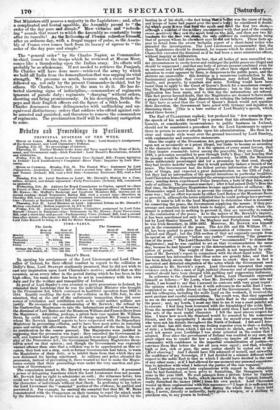The " general order " by Sir Charles Napier, as
Commander- in-chief, issued to the troops which he reviewed at Meean Meer, comes like a thunderclap upon the Indian army. Its effects will probably be as wholesome. If not needed to retrieve the Punjaub, Sir Charles will have done more—retrieved the army. by which we' hold all India from the demoralization that was sapping its vital strength. We presume as much, because such a record must be followed up, not only by the present Commander-in-chief, but by others. Sir Charles, however, is the man to do it has de- tected alarming signs of indiscipline,—commanders of regiments ignorant of parade duty; regiments " charging" without orders, shouting and firing promiscuously. In his description, British Se- poys and their English officers cut the figure of a Sikh horde. Sir Charles denounces these delinquencies with unflinching and un- equivocal distinctness; orders that soldiers who-offend against rule be arrested and punished, and threatens to remove the commanders of regiments. The proclamation itself will be sufficient castigation to some.


























 Previous page
Previous page